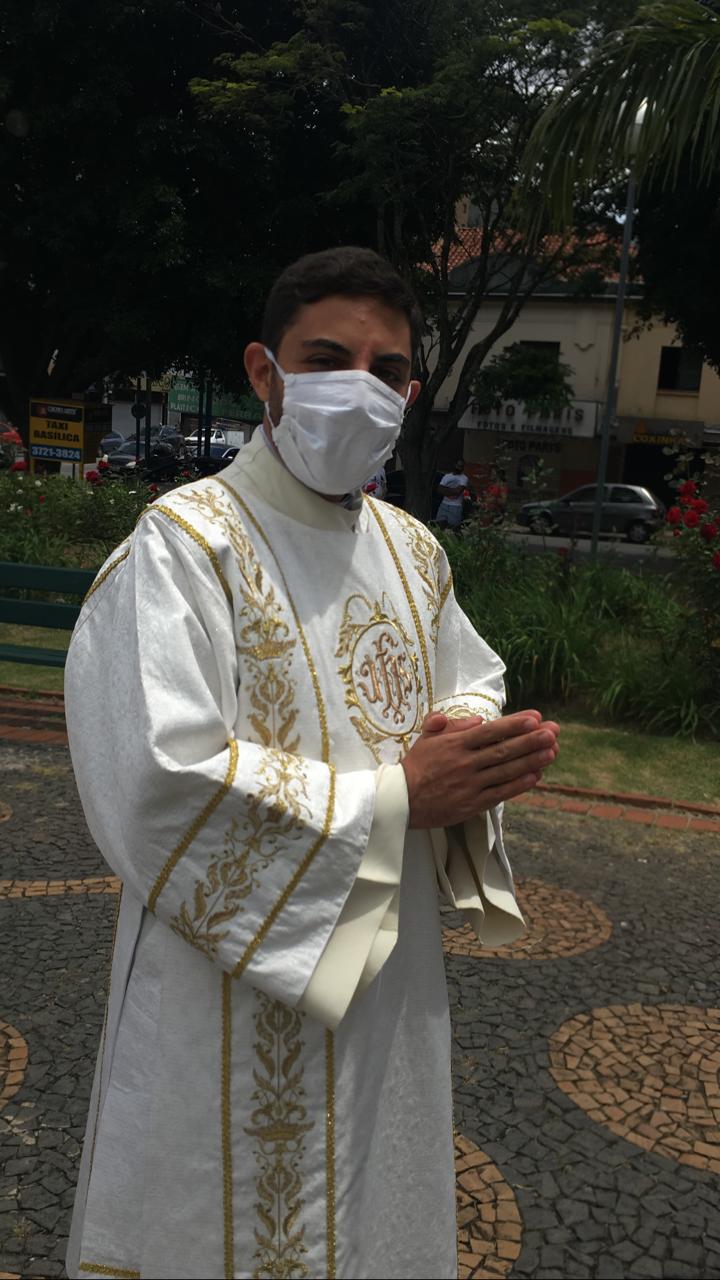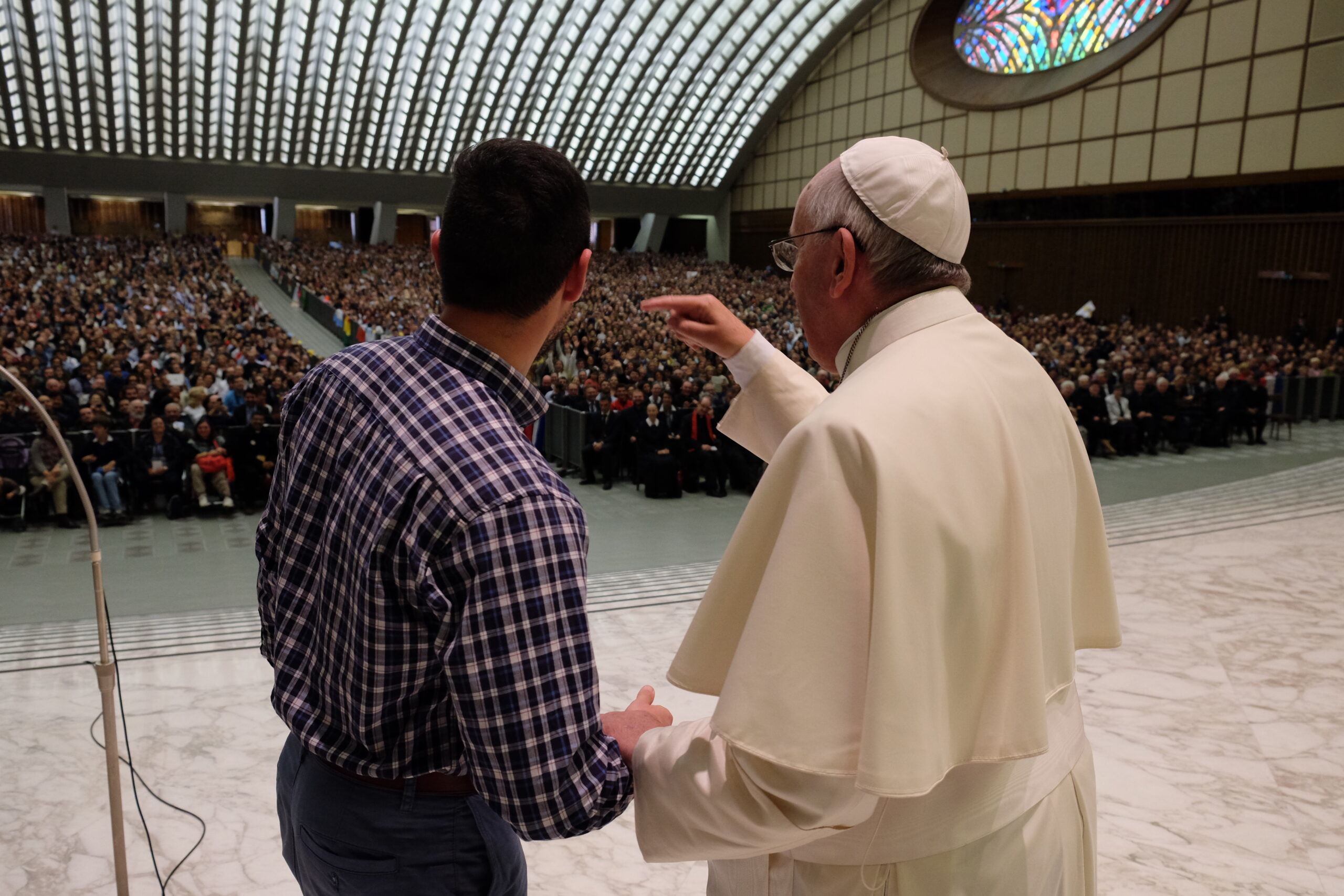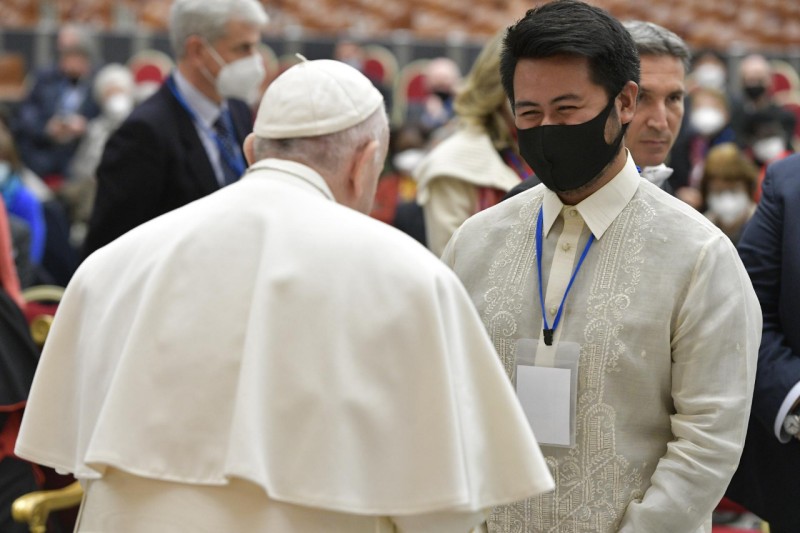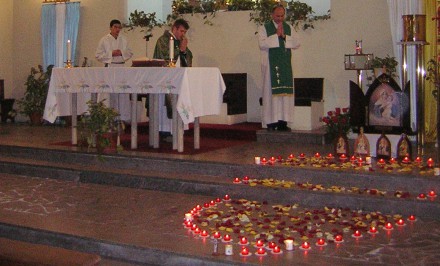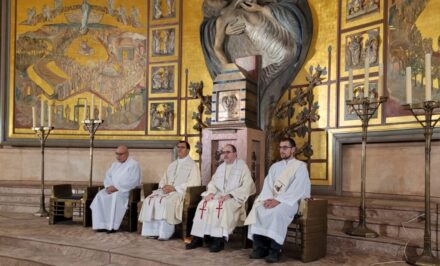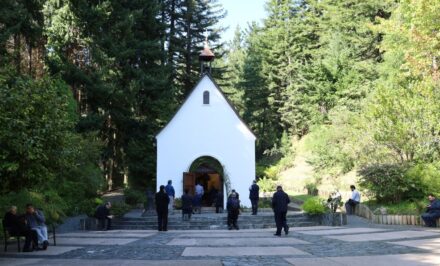Fr. Rafael Mota, Schoenstatt Father, Brazil •
I would like to share my reflections about the recent message by Pope Francis to the Focolare Movement at the end of his General Assembly in early February. —
How is this message relevant for us?
Strictly speaking, this reflection is addressed to the Focolare Movement. Therefore, we can’t simply transplant it into our reality. In the Church’s organizational structure, Focolare and Schoenstatt belong to the same category – movements and new communities – but we cannot presume that the words addressed to one automatically apply to the other.
However, we have something in common. Guided by their founders, both movements emerged in the mid-twentieth century to offer men and women a charism that motivates them to aspire to holiness in the modern world. Attachments, dialogue with culture, family, youth, professional people … And yes, we want to be fair, the reach that the Focolare have had should makes us happy – or impress us or challenge us. (Click https://www.focolare.org/en for more information).
There is a contextual link between us – the desire to revisit our history with the hope of renewal. This is what makes Pope Francis’ message relevant: at the end of his General Assembly with the Focolare Movement when Margaret Karram was elected as the movement’s new president. Margaret replaces Maria Voce, the successor of the founder Chiara Lubich – who was born 101 years ago and died 13 years ago. In other words, they are beginning a process of refounding, similar to what Schoenstatt underwent in 2014.
With these elements, I think it is a good idea to pay attention to what Pope Francis is telling us:
Three ingredients for a single recipe
Francis refers to three issues —
- After the founder
- The importance of crises
- Living the spirituality coherently and realistically –
which, in my opinion, is like a healthy broth, communally called “dynamic faithfulness” (or creative, according to the title of the book by Jesus Moran, the co-president of the Focolare).
Anyone who partakes of this broth immediately notices the “taste” of the Second Vatican Council, with its characteristic tones of “returning to the original source” and “aggiornamento” [modernization]. More simply put, the message gives us strength to achieve what the Church as a whole is trying to do within the reality of our movement. It is more than this. It is what God is doing with the Church. This has been the emphasis of this pontificate since Evangelii Gaudium.
Francis wants to awaken mature agency and show the fundamental categories of change that are already underway. Only from this perspective can we see the importance with which the Pope communicates the message of overcoming self-referentiality, resilience as a way to deal with crises as opportunities and sinodality.
Two points of comparison
In addition to the apostolic exhortation Evangelii Gaudium that I mentioned earlier, I would like to recall that talk that Pope Francis gave to the participants of the General Chapter of the Discalced Augustinians (12 September 2019). The following extract is another description of “dynamic faithfulness”:
“You Discalced Augustinians have your roots in this long religious tradition begun by Saint Augustine, as the Prior General recalled a moment ago. I encourage you to love and deepen these roots ever anew – to go to your roots – seeking to draw from them, in prayer and in community discernment, the lifeblood for your presence in the Church and the world today. To be modern, some believe that it is necessary to detach oneself from roots. And this causes ruin, because roots, tradition, are the guarantee of the future. It is not a museum, it is a true tradition, and the roots are the tradition that bring you the sap to make the tree grow, bloom, and bear fruit. Never detach yourself from roots in order to be modern, that is suicide.
[…]
The Spirit blows in the sails of the Church also the wind of the missio ad gentes, and you have known how to be ready to depart. We live in an age in which the missio ad gentes is renewing itself, also through a crisis that that we want to be of growth, of fidelity to the mandate of the Risen Lord, a mandate that retains all its strength and relevance. I too join you with emotion in remembering the Augustinian missionaries who gave their lives for the Gospel in different parts of the world. And I see with pleasure that you treasure these witnesses of the past in order to renew your readiness for mission today, in the forms that Vatican Council II and the current challenges ask of us.
And if the example of the Descalced Augustinians seems far removed from our context, I propose a reading of the Pope Francis’ address to the youth of Chile (17 January 2018). Certainly, because I was there. It follows below:
“[Young people] you like adventures and challenges. (…) After all, you get bored when there are no challenges to excite you. We see this, for example, whenever there is a natural disaster. You have an amazing ability to mobilize, which is a sure sign of the generosity of your hearts.
In my work as a bishop, I came to see how many good ideas there are in young people, in their minds and hearts. And this is true, you are restless; you are seekers and idealists. You are restless; you are seekers and idealists.
The problem we adults have is that, when we hear about those ideals, when we hear about these worries of the youth, like know-it-alls, we say: “They think that way because they are young; they still have to grow up” (…) there lies hidden the idea that growing up means accepting injustice, believing that nothing can be done, that this is the way things have always been.
(…) It is for your reality, the youth, that I wanted to tell you I have called together a Synod for your faith and your discernment (…) to listen to you, to hear you directly, because it is important that you speak; do not let yourselves be silenced (…) so that we can help the Church have a young face. (…) the Church must have a young face, and you have to give it to us. However, a young face is real, full of life, not by applying cosmetics (…) rather she is young by letting herself be challenged deep down. This is what we, what Holy Mother Church, needs from you today: that you challenge us (…) that you shake the ground beneath our fixed feet, and help us to be closer to Jesus. Your questions, wanting to know about you, your desire to be generous, are all necessary for us to draw closer to Jesus. All of us are invited, ever anew, to draw near to Jesus.
How do we do this?
This is where I lack the ability to find a sure path. Nevertheless, I think of daring, audacious alternatives that entail risk. Despite this, this is all that I can and wish to recommend.
The first is to place ourselves into the currents of Schoenstatt, the Church and the world. We do not want to start with the voices in our heads. It is very important to know and understand our context, to differentiate it from other realities and to listen to many voices and different visions.
Then, to be joyful with what is there and to collaborate. It does not mean creating a leader to solve all problems. This is the path of humility and recognition of our own weaknesses that cause us to need external help. If we do not do this, dialogue loses its meaning and it crushes greater curiosity, desire, enthusiasm, and generosity.
Finally, to encounter God who speaks from within. We cannot wait for motivation and inspiration to come from without, always tugged at by others. Our faith leads us to believe that even before we set out to do a good deed, the Holy Spirit has already moved us toward this. In the words of Pope Francis, God makes the first move.
With this, I leave you my blessing and hope that this reflection may help you to continue on the path.
Original: Portuguese. Translation: Sarah-Leah Pimentel, Cape Town, South Africa
ADDRESS OF HIS HOLINESS POPE FRANCIS
TO PARTICIPANTS IN THE GENERAL ASSEMBLY
OF THE FOCOLARE MOVEMENT
Paul VI Audience Hall
Saturday, 6 February 2021
I am glad to welcome you at the conclusion of your General Assembly, in which you have discussed important issues and chosen your new leaders. I thank the outgoing president, Maria Voce — thank you, Maria, you have been very good and very compassionate. Thank you! — and the newly elected president, Margaret Karram, for their kind words and for having remembered that evening of prayer for unity and peace in the Holy Land with the President of Israel and the President of the State of Palestine. They were promising times, but there is always promise. It is important to go forth and carry the Holy Land in our hearts, always, always. I offer you, as I said to Maria, a big “thank you”, heartfelt good wishes, which we also extend to the co-president and the councillors. I am pleased that Cardinal Kevin Farrell and Mrs Linda Ghisoni, the Undersecretary, are here. I greet all of you here present and those who are linked in by streaming; and I extend my greeting to all the members of the Work of Mary, whom you represent.
In order to encourage you on your journey, I would like to offer you a few reflections, which I will divide into three points: the period after the Foundress; the importance of crises; and living spirituality with coherence and realism.
After the Foundress. Twelve years after Chiara Lubich departed for Heaven, you are called to overcome the natural bewilderment and also the decline in numbers, in order to continue to be a living expression of the founding charism. As we know, this requires a dynamic fidelity, capable of interpreting the signs and needs of the times and responding to the new demands posed by humanity. Every charism is creative. It is not a statue in a museum, no; it is creative.
It is a question of remaining faithful to the original source, striving to rethink it and express it in dialogue with the new social and cultural situations. It is firmly rooted, but the tree grows in dialogue with reality. This task of updating is all the more fruitful the more it is carried out by harmonizing creativity, wisdom, sensitivity to all and fidelity to the Church. Your spirituality, characterized by dialogue and openness to different cultural, social and religious contexts, can certainly favour this process. Openness to others, whoever they may be, must always be cultivated: the Gospel is meant for everyone, but not by proselytism, no; it is meant for everyone; it is a leaven of new humanity in every place and in every time.
This attitude of openness and dialogue will help you to avoid any self-absorption, which is always a sin; it is a temptation to look in the mirror. No, this is bad. Just to comb your hair in the morning and nothing more! This avoidance of all self-absorption, which never comes from the good spirit, is our hope for the whole Church: to beware of self-centredness, which always leads to defending the institution to the detriment of individuals, and which can also lead to justifying or covering up forms of abuse. We have experienced this with so much pain; we have discovered it in these recent years. Self-absorption prevents us from seeing mistakes and shortcomings; it hinders progress; it impedes an open review of institutional procedures and styles of governance. Instead, it is better to be courageous and to face problems with parrhesia and truth, always following the indications of the Church, who is Mother, the true Mother, and responding to the demands of justice and charity. Self-celebration does not render good service to the charism. No. Rather, it is a matter of welcoming each day with wonder — do not forget wonder, which always indicates the presence of God — the freely-given gift you have received by meeting your ideal of life and, with God’s help, trying to correspond to it with faith, humility and courage, like the Virgin Mary after the Annunciation.
The second theme I would like to propose to you is the importance of crises. You cannot live without crisis. Crises are a blessing, even on a natural level — the crises of a child growing up to maturity are important — and even in the life of institutions. I spoke about this at length in my recent address to the Roman Curia. There is always the temptation to turn crisis into conflict. Conflict is ugly; it can become ugly; it can divide, but crisis is an opportunity to grow. Every crisis is a call to new maturity; it is a time of the Spirit, which arouses the need to perform an update, without becoming discouraged in the face of human complexity and its contradictions. Today there is much emphasis on the importance of resilience in the face of difficulties, that is, the ability to face them positively, drawing opportunities from them. Every crisis is an opportunity to grow. It is the responsibility of those who hold positions of governance, at all levels, to work in order to face in the best, most constructive way, community and organizational crises; on the other hand, the spiritual crises of individuals, which involve the intimacy of the person and the sphere of conscience, must be dealt with prudently by those who do not hold positions of governance, at all levels, within the Movement. And this has been a good rule of the Church since time immemorial — from monastics, always — which applies not only to moments of crisis of individuals; it applies in general to their accompaniment in the spiritual journey. It is that wise distinction between the external and internal forum that the experience and tradition of the Church teaches us is indispensable. In fact, the intermingling of the sphere of governance and the sphere of conscience gives rise to abuses of power and to other abuses that we have witnessed, when the cauldron of these ugly problems is uncovered.
Lastly, the third point: living spirituality with consistency and realism . Consistency and realism. “This person is authoritative… Why is he authoritative? Because he is consistent”. Very often we say this. The ultimate aim of your charism coincides with the intention that Jesus presented to the Father in his final great prayer: that “they may all be one” (Jn 17:21), united, well aware that this is the work of the grace of the Triune God: “as thou, Father, art in me, and I in thee, that they also may be in us” (ibid.). This intention demands commitment from a twofold perspective: outside the Movement and within it. With regard to acting outside the Movement, I encourage you to be — and in this, the Servant of God Chiara Lubich gave many examples! — witnesses of closeness with fraternal love that overcomes every barrier and reaches every human condition. Overcome barriers, do not be afraid! It is the path of fraternal closeness that transmits the presence of the Risen One to the men and women of our time, starting with the poor, the least, the rejected: working together with people of good will for the promotion of justice and peace. Do not forget that closeness, proximity, was God’s most authentic language. Let us consider that passage of Deuteronomy, when the Lord says: ‘Think: what people has had its gods as close as you have me?’ That style of God, of closeness, went farther, farther and farther until it reached that great, essential closeness: the Word made flesh, God who became one with us. Do not forget: closeness is God’s style; it is the most authentic language, in my opinion.
With regard to your effort within the Movement, I urge you to increasingly promote synodality, so that all members, as depositaries of the same charism, may be co-responsible for and participants in the life of the Work of Mary and its specific goals. Those who are responsible for governance are called to foster and implement transparent consultation not only within the governing bodies, but at all levels, by virtue of that logic of communion according to which all can place at the service of others their gifts and opinions in truth and with freedom.
Dear brothers and sisters, in imitation of Chiara Lubich, always listen to Christ’s cry of abandonment on the cross, which manifests the highest measure of love. The grace that comes from it is capable of inspiring in us, weak and sinners as we are, generous and sometimes heroic responses; it is capable of transforming suffering and even tragedy into a source of light and hope for humanity. In this passing from death to life lies the heart of Christianity and also of your charism. Thank you so much for your joyful witness to the Gospel that you continue to offer to the Church and to the world. Joyful witness. It is said that the Focolarini always smile; they always have a smile on their face. And I remember once I heard a talk about the ignorance of God. They said to me: “But do you know that God is ignorant? There are four things that God cannot know” — “But what are they?” — “What the Jesuits think, how much money the Salesians have, how many congregations of nuns there are and what the Focolarini are smiling about”. I entrust your good intentions and projects to the maternal intercession of Mary Most Holy, Mother of the Church, and I bless you wholeheartedly. And please do not forget to pray for me, for I need it. Thank you!
*L’Osservatore Romano, Weekly edition in English, 12 February 2021.
Cuidarnos de cualquier autorreferencialidad y captar en cada crisis una oportunidad para crecer



